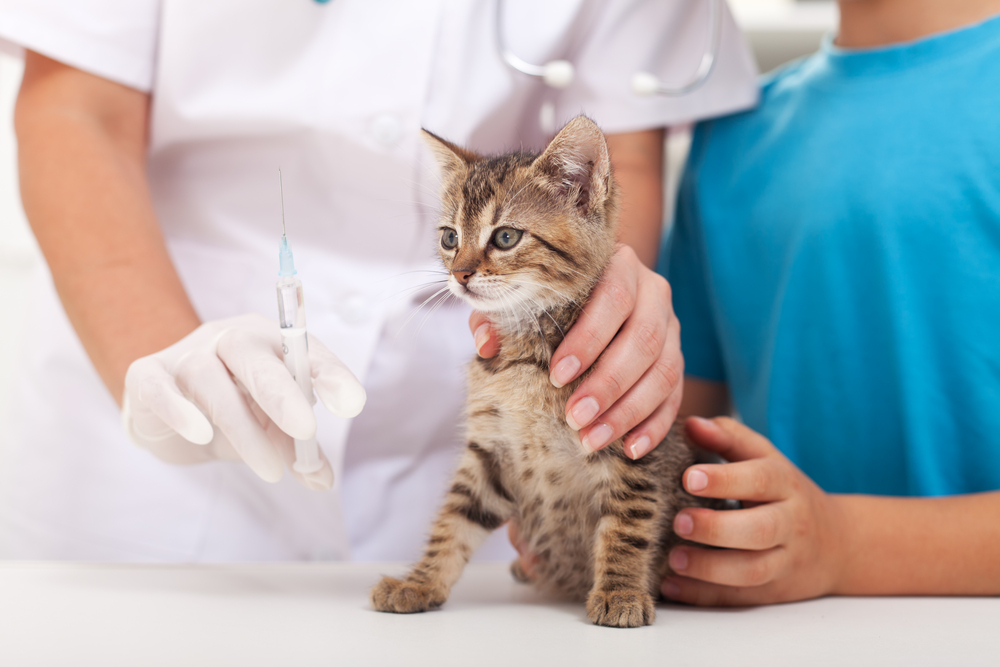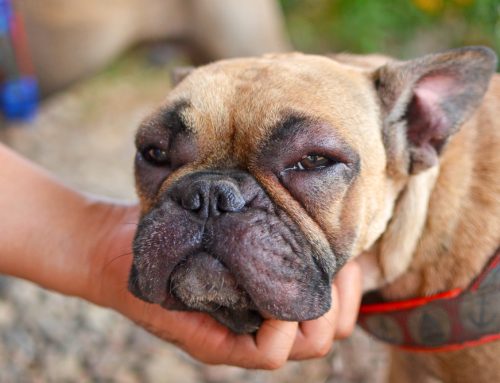Vaccines are an essential aspect of your pet’s veterinary care. Your pet’s vaccines provide immunity against common infectious—often deadly—diseases, and reduce your risk of contracting a zoonotic disease (i.e., an infectious disease that animals can transmit to humans). Follow our All Creatures Animal Hospital team’s guide to learn which diseases vaccines prevent your pet from contracting.
How vaccines protect your pet
By stimulating antibody protection, a vaccine triggers your pet’s protective immune response and prepares their immune system to fight a disease’s future infection. To protect your pet’s health and prevent many life-threatening infectious diseases, our veterinarians consider your pet’s age, health, and lifestyle when recommending non-core vaccines. To protect all pets from prevalent infectious diseases, veterinarians recommend core vaccines, some of which are required by law.
Core—rabies vaccine for dogs and cats
Rabies is a neurologic disease transmitted through an infected animal’s bite. Rabies is a zoonotic disease for which no treatment exists once the disease’s clinical signs appear, and is nearly always fatal. Because this disease poses a significant threat to humans and pets, most states—by law—require all dogs and cats to receive the rabies vaccine.
Core—DA2PP vaccine for dogs

Puppies and dogs are at risk for several diseases that one combination vaccine can prevent them from contracting. The DA2PP vaccine protects puppies and dogs from the following diseases:
- Distemper virus — Distemper is a viral disease that attacks the respiratory, gastrointestinal, and nervous systems of infected dogs. The virus is transmitted by direct contact with an infected dog and through shared contaminated food, water, and equipment. Signs include fever, nasal discharge, coughing, lethargy, and vomiting. Distemper causes progressive neurologic signs, and is often fatal.
- Parvovirus — Parvovirus is one of the most infectious—often fatal—diseases that affects young puppies and unvaccinated dogs. Parvo spreads easily through contact with an infected dog’s feces. This infectious disease affects the gastrointestinal tract, causing vomiting, diarrhea, and dehydration. Without treatment, death typically occurs 48 to 72 hours after clinical signs begin.
- Infectious hepatitis — Canine adenovirus type-1 (CAV-1) causes infectious hepatitis, which attacks the liver. An infected animal’s urine, or ocular or nasal discharge transmits the disease. In mild cases, signs include decreased appetite, lethargy, and mild fever. Some dogs develop corneal edema, which make their eyes look cloudy, and some dogs experience respiratory problems, including a cough, and ocular and nasal discharge. Puppies usually experience severe cases, and the signs include fever, lethargy, decreased appetite, vomiting, diarrhea, and jaundice. The DA2PP vaccine contains CAV-2, which protects against adenovirus-related respiratory disease and infectious hepatitis.
- Canine parainfluenza virus — This highly contagious respiratory virus commonly causes infectious tracheobronchitis (i.e., kennel cough). When an infected dog coughs or sneezes, their respiratory droplets spread the virus, especially when they are housed in close quarters such as kennels.
Core—FVRCP vaccine for cats
Kittens and cats are at risk for several diseases that one combination vaccine can prevent them from contracting. The FVRCP vaccine protects cats from the following highly contagious and life-threatening feline diseases:
- Feline viral rhinotracheitis — Feline viral rhinotracheitis (FVR) is caused by a feline herpesvirus, and causes respiratory disease in cats and kittens. Many infected cats are lifelong carriers, and experience flare-ups when they are sick or stressed. Infected cats can also shed the virus, though they may appear healthy, potentially spreading it to unprotected cats.
- Feline calicivirus — Feline calicivirus is a common respiratory infection that can be spread through contact with an infected cats’ saliva and respiratory secretions. A cat can also contract the disease through contact with contaminated objects such as food bowls, bedding, or toys. Signs include sneezing, nasal discharge, fever, and lethargy.
- Feline panleukopenia — Feline parvovirus causes panleukopenia. The virus is primarily spread through an infected cat’s feces. Signs include depression, inappetence, fever, vomiting, and severe diarrhea and dehydration. Panleukopenia is often fatal without aggressive treatment.
Non-core vaccines for pets
To protect your pet’s health and prevent many life-threatening infectious diseases, our veterinarians consider your pet’s age, health, and lifestyle when recommending non-core vaccines. Strongly recommended non-core vaccinations include:
- Bordetella bronchiseptica vaccine for dogs and cats
- Leptospirosis vaccine for dogs
- Canine influenza virus vaccine for dogs
- Lyme disease vaccine for dogs
- Feline leukemia virus (FeLV) vaccine for cats
- Chlamydophila felis vaccine for cats
Your pet’s vaccines protect them from dangerous diseases, but only when they are current. Contact our All Creatures Animal Hospital team if you have vaccine-related questions, or would like to schedule an appointment to ensure your pet’s vaccinations are up to date.














Leave A Comment